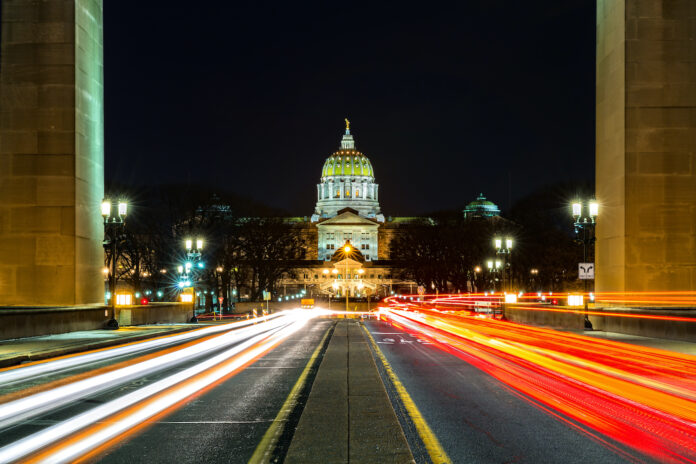HARRISBURG, Pa. – Adult-use cannabis sales in Pennsylvania are projected to generate $1.7 billion to $2.8 billion dollars while adding up to 45,000 jobs within the first year of legalization, according to a new report from Responsible PA and FTI Consulting. Under a conservative estimate — or what’s described by analysts as the base case — recreational cannabis legalization would lead to an additional $4.2 billion in economic output and $2.6 billion in gross domestic product (GDP) for the state.
The financial impact report comes on the heels of a promise from state lawmakers to file a bipartisan bill legalizing recreational cannabis. On June 17, State Reps. Aaron Kaufer (R) and Emily Kinkead (D) published a cosponsorship memo seeking additional colleagues to support their bill. The memo suggests Pennsylvania should legalize adult use to keep revenues and tax dollars within the state instead of allowing the money to cross state lines. According to the memo, Ohio is flooding towns along its border with “the lion’s share” of the state’s recreational licenses.
While the Pennsylvania bill’s language hasn’t been finalized, Kaufer and Kinkead intend to establish parameters for a regulated cannabis market under the Pennsylvania Department of Agriculture. The pair seeks to prioritize licensing for small businesses, specifically rural, minority, female, and veteran-owned businesses. Tax revenue will be used to fund enforcement of cannabis regulations and local municipalities with cannabis businesses. In anticipation of an adult-use market, Gov. Josh Shapiro (D) asked lawmakers to pass a 20-percent tax on recreational marijuana sales as part of his February budget pitch. However, time is running out with a budget due June 30 and a GOP-led state Senate.
For its analysis, FTI collected medical and adult-use data from Arizona, Illinois, Massachusetts, and New Jersey to determine the “medical-to-adult use multiplier” from each state’s first year of recreational sales. New Jersey and Massachusetts had the largest multipliers — 5.4 and 3.6, respectively — but similarities between the Arizona, Illinois, and Pennsylvania regulatory environments led to the much smaller base case multiplier of 1.8.
Noting Pennsylvania’s $1.2 billion in medical cannabis sales in 2023, FTI projected the base case or conservative estimate for the first year of sales as $1.2 billion. With the assumption of a 33-percent retail margin, the industry could see $700 million in retail marginal revenue and $1.4 billion in wholesale sales. Under the base case, adult-use sales would generate $126 million in new state sales tax revenue and $212 million in state wholesale excise tax. Tax revenue is based on an estimated retail sales tax of 6 percent and wholesale cannabis excise tax of 15 percent.
The report also looks at job figures, showing an estimated range of 26,260 to 44,520 total jobs created. In the base case, a $2.1 billion recreational marketplace would support more than 33,000 jobs. Of those, roughly 66 percent would directly support the cannabis sector, with 13 percent in the supply chain. Another 20 percent would be jobs created by the spending of those newly employed in cannabis-related jobs.
The report also focuses on the average dispensary’s economic impact, showing each dispensary supporting nearly 110 jobs with $6.7 million in estimated sales for the first year. Each retail location would help generate more than $1 million in sales and local taxes through retail sales and wholesale excise taxes in addition to traditional corporate income, property, and other taxes. Each dispensary would contribute about $8 million to the state’s GDP and about $6 million in income for local workers.
Based on the average distance traveled per order and population density per dispensary, the following counties in Pennsylvania are considered underserved by the cannabis industry.
- Adams
- Beaver
- Bedford
- Bradford
- Clinton
- Fayette
- Juniata
- Northumberland
- Pike
- Schuylkill
- Tioga
- Venango
- Warren









